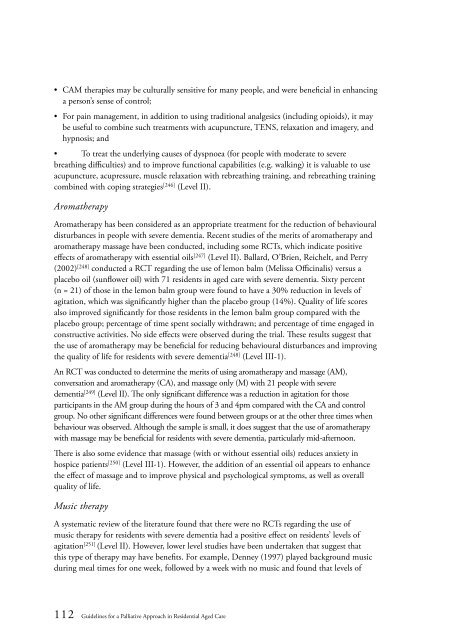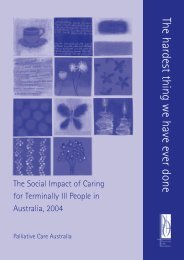Guidelines for a Palliative Approach in Residential Aged Care
Guidelines for a Palliative Approach in Residential Aged Care
Guidelines for a Palliative Approach in Residential Aged Care
Create successful ePaper yourself
Turn your PDF publications into a flip-book with our unique Google optimized e-Paper software.
• CAM therapies may be culturally sensitive <strong>for</strong> many people, and were beneficial <strong>in</strong> enhanc<strong>in</strong>g<br />
a person’s sense of control;<br />
• For pa<strong>in</strong> management, <strong>in</strong> addition to us<strong>in</strong>g traditional analgesics (<strong>in</strong>clud<strong>in</strong>g opioids), it may<br />
be useful to comb<strong>in</strong>e such treatments with acupuncture, TENS, relaxation and imagery, and<br />
hypnosis; and<br />
• To treat the underly<strong>in</strong>g causes of dyspnoea (<strong>for</strong> people with moderate to severe<br />
breath<strong>in</strong>g difficulties) and to improve functional capabilities (e.g. walk<strong>in</strong>g) it is valuable to use<br />
acupuncture, acupressure, muscle relaxation with rebreath<strong>in</strong>g tra<strong>in</strong><strong>in</strong>g, and rebreath<strong>in</strong>g tra<strong>in</strong><strong>in</strong>g<br />
comb<strong>in</strong>ed with cop<strong>in</strong>g strategies [246] (Level II).<br />
Aromatherapy<br />
Aromatherapy has been considered as an appropriate treatment <strong>for</strong> the reduction of behavioural<br />
disturbances <strong>in</strong> people with severe dementia. Recent studies of the merits of aromatherapy and<br />
aromatherapy massage have been conducted, <strong>in</strong>clud<strong>in</strong>g some RCTs, which <strong>in</strong>dicate positive<br />
effects of aromatherapy with essential oils [247] (Level II). Ballard, O’Brien, Reichelt, and Perry<br />
(2002) [248] conducted a RCT regard<strong>in</strong>g the use of lemon balm (Melissa Offic<strong>in</strong>alis) versus a<br />
placebo oil (sunflower oil) with 71 residents <strong>in</strong> aged care with severe dementia. Sixty percent<br />
(n = 21) of those <strong>in</strong> the lemon balm group were found to have a 30% reduction <strong>in</strong> levels of<br />
agitation, which was significantly higher than the placebo group (14%). Quality of life scores<br />
also improved significantly <strong>for</strong> those residents <strong>in</strong> the lemon balm group compared with the<br />
placebo group; percentage of time spent socially withdrawn; and percentage of time engaged <strong>in</strong><br />
constructive activities. No side effects were observed dur<strong>in</strong>g the trial. These results suggest that<br />
the use of aromatherapy may be beneficial <strong>for</strong> reduc<strong>in</strong>g behavioural disturbances and improv<strong>in</strong>g<br />
the quality of life <strong>for</strong> residents with severe dementia [248] (Level III-1).<br />
An RCT was conducted to determ<strong>in</strong>e the merits of us<strong>in</strong>g aromatherapy and massage (AM),<br />
conversation and aromatherapy (CA), and massage only (M) with 21 people with severe<br />
dementia [249] (Level II). The only significant difference was a reduction <strong>in</strong> agitation <strong>for</strong> those<br />
participants <strong>in</strong> the AM group dur<strong>in</strong>g the hours of 3 and 4pm compared with the CA and control<br />
group. No other significant differences were found between groups or at the other three times when<br />
behaviour was observed. Although the sample is small, it does suggest that the use of aromatherapy<br />
with massage may be beneficial <strong>for</strong> residents with severe dementia, particularly mid-afternoon.<br />
There is also some evidence that massage (with or without essential oils) reduces anxiety <strong>in</strong><br />
hospice patients [250] (Level III-1). However, the addition of an essential oil appears to enhance<br />
the effect of massage and to improve physical and psychological symptoms, as well as overall<br />
quality of life.<br />
Music therapy<br />
A systematic review of the literature found that there were no RCTs regard<strong>in</strong>g the use of<br />
music therapy <strong>for</strong> residents with severe dementia had a positive effect on residents’ levels of<br />
agitation [251] (Level II). However, lower level studies have been undertaken that suggest that<br />
this type of therapy may have benefits. For example, Denney (1997) played background music<br />
dur<strong>in</strong>g meal times <strong>for</strong> one week, followed by a week with no music and found that levels of<br />
112 <strong>Guidel<strong>in</strong>es</strong> <strong>for</strong> a <strong>Palliative</strong> <strong>Approach</strong> <strong>in</strong> <strong>Residential</strong> <strong>Aged</strong> <strong>Care</strong>
















